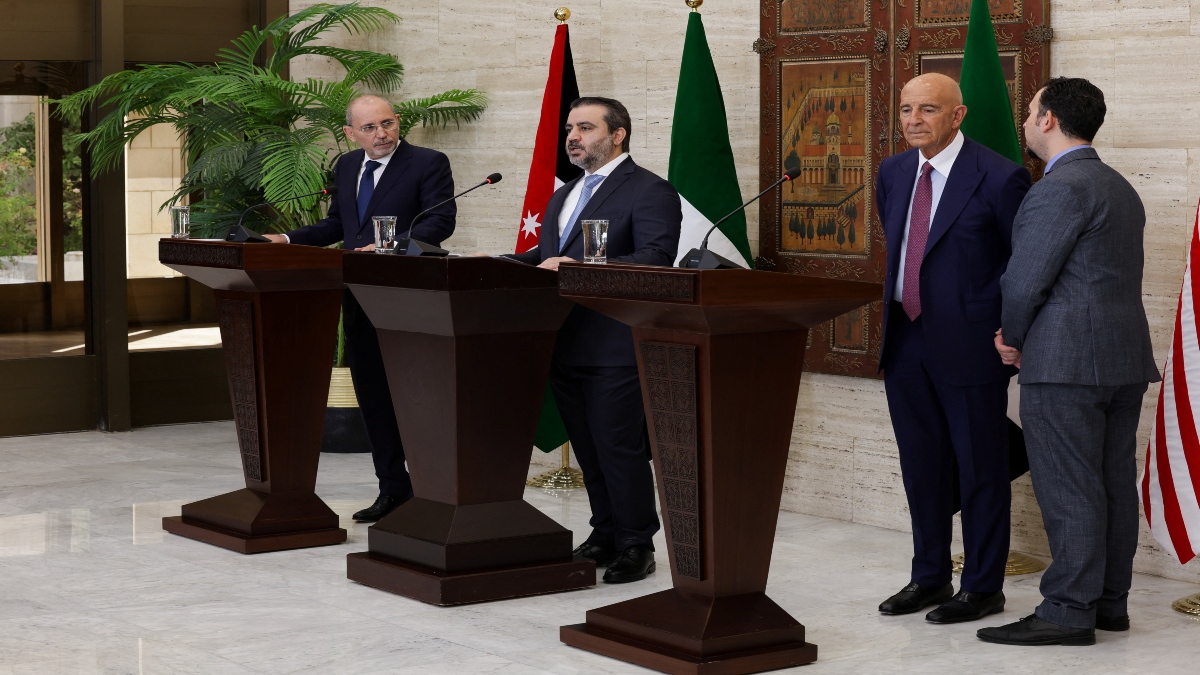Syria on Tuesday said that it has reached an agreement on a comprehensive roadmap for the southern governorate of Sweida, with the backing of Jordan and the United States, according to an Arab News report.
Officials hailed the deal as a historic milestone aimed at restoring security, accountability, and national reconciliation in a region recently shaken by unrest.
The announcement followed high-level talks in Damascus, where Syrian Foreign Minister Asaad Hassan Al-Shibani met with Jordanian Foreign Minister Ayman Safadi and US Special Envoy to Syria Thomas Barrack.
Shibani described the newly signed agreement as a breakthrough for Syria’s internal stability.
“We want to stabilise southern Syria,” Arab News quoted Shibani as saying, underscoring the deal’s broader significance.
He added that the roadmap “serves the interest of all Syrians” and includes mechanisms to hold perpetrators of violence accountable while launching a wider reconciliation process.
The Sweida region, which has a Druze-majority population, has been a flashpoint in recent months. On Sunday, renewed sectarian clashes erupted between Druze fighters and Sunni Bedouins, leaving at least four people dead, according to the Syrian Observatory for Human Rights, a UK-based war monitor.
The Syrian government accused local groups of violating a fragile ceasefire agreement reached last month.
The earlier round of violence in July killed over 1,400 people, drawing in government forces and tribal fighters who supported the Bedouins. Although a ceasefire ended that week of bloodshed, tensions never fully subsided and have now reignited, highlighting the urgent need for a sustainable peace mechanism in the region.
Amid the ongoing unrest, Israel is reportedly playing a covert role in the Sweida region.
According to a Reuters report on Tuesday, Israel has been working to unite splintered Druze factions, providing them with arms, ammunition, and even paying salaries for many of the approximately 3,000 Druze militia members active in the area.
Two senior Syrian Druze figures, speaking on condition of anonymity, confirmed that Israel’s assistance began after the deadly July clashes, and was aimed at consolidating Druze militias in response to attacks and massacres.
A Western intelligence source cited in the report also said that Israel’s support to the Druze is part of a broader effort to counter instability near its border and potentially create new leverage in its dealings with Damascus.
Simultaneously, Syria is said to be accelerating indirect talks with Israel, under pressure from Washington, over a potential security pact. While such a pact would fall short of a full peace agreement, it reportedly aims to reverse recent Israeli land seizures and establish new regional security arrangements.
Adding complexity to the volatile situation is the evolving political landscape in Damascus.
The Syrian government, now led by interim President Ahmad al-Sharaa following the shock ousting of Bashar al-Assad in December, has struggled to consolidate control. Sharaa’s ascent marked the end of the Assad family’s decades-long autocratic rule, but his de facto Islamist governance and cooperation with militant-affiliated fighters have drawn criticism from political opponents and raised concerns among ethnic and religious minorities, particularly in regions like Sweida.
According to the report, the new agreement is expected to address both the security concerns and the socio-political grievances voiced by residents.
Jordanian Foreign Minister Ayman Safadi emphasised the regional stakes of stability in southern Syria.
“The security of southern Syria is the security of Jordan. Its stability is essential to ours,” he was quoted as saying.
Safadi also condemned recent Israeli airstrikes in Syria and referred to the ongoing crisis in Sweida as “tragic,” urging for resolution through cooperation.
US Special Envoy Thomas Barrack called the accord a major turning point in American engagement with Damascus.
“America is committed to nurturing, supporting, and assisting the Syrian government,” Barrack stated, calling the roadmap “historic.”
He further noted that Syria is now led by a “young government seeking prosperity.”
The agreement’s exact terms have not been publicly disclosed, but officials confirmed it includes provisions for security sector reform, localised ceasefires, and inclusive dialogue in Sweida.
The deal also marks one of the first public acknowledgments of direct US diplomatic support for Syria in years, signaling a potential shift in Washington’s posture toward Damascus.
The three nations are expected to form a joint monitoring committee to oversee the implementation of the roadmap over the coming months.
More details are expected to emerge following follow-up meetings scheduled for later this week.
With inputs from agencies
End of Article

)

